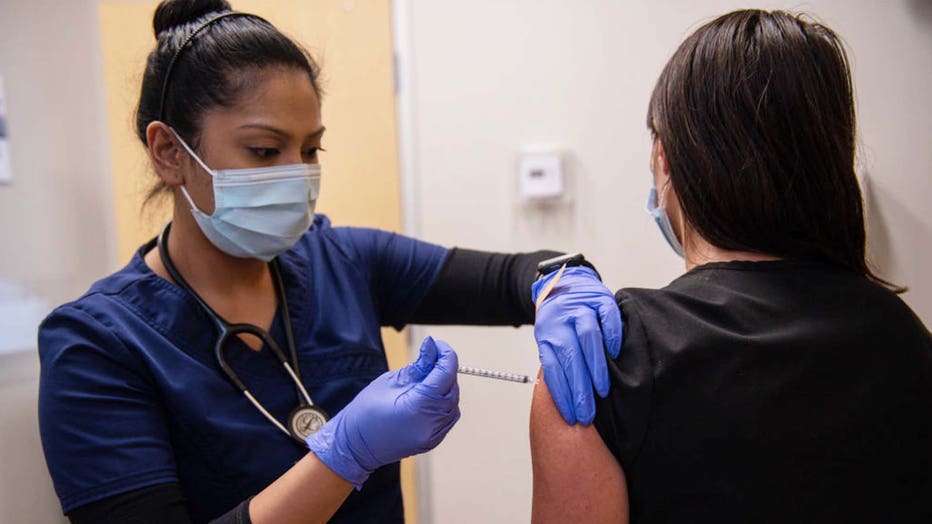Omicron COVID-19 case detected in Colorado
The first case of the highly transmissible omicron coronavirus variant has been detected in Colorado, according to the Colorado Department of Public Health and Environment.
The variant was detected in an adult female who lives in Arapahoe County, according to the state health department. The woman recently returned from a trip to southern Africa.
She was fully vaccinated, but had yet to receive a booster dose of the COVID-19 vaccine, according to health officials.
"She is experiencing minor symptoms and is isolated and recuperating at home," a state health department news release continued.
Once the woman was tested, genome sequencing was conducted on the sample she provided and the presence of the omicron variant was detected, according to the health department.

FILE - A health care worker administers a third dose of the Moderna COVID-19 vaccine at the CareNow Denver University urgent care center in Denver, Colorado, U.S. (Daniel Brenner/Bloomberg via Getty Images)
RELATED: US to require all inbound travelers to take COVID-19 test 1 day before flight
Colorado Gov. Jared Polis also made the announcement on Twitter Thursday and advised the public not to "panic," but stressed the importance of getting vaccinated.
"It’s particularly critical that Coloradans heed caution and get vaccinated, get a booster dose, wear a mask in indoor public spaces, limit large gatherings, wash their hands frequently, get tested if they have symptoms or were exposed, and practice physical distancing," Polis wrote.
The U.S. recorded its first known omicron infection on Wednesday, in a fully vaccinated person who had returned to California from South Africa, where the variant was first identified just over a week ago.
"We knew it was just a matter of time before the first case of omicron would be detected in the United States," Dr. Anthony Fauci said during a White House news conference on Wednesday.
A second U.S. case was confirmed Thursday in Minnesota, involving a vaccinated man who had attended an anime convention in New York City just before Thanksgiving. Minnesota health officials said he had no history of international travel.
RELATED: Amid omicron COVID-19 variant worries, US still battling delta wave
Also on Thursday, the Biden administration announced that all travelers to the U.S. must provide proof of a negative COVID-19 test within one day of boarding their flights, regardless of nationality or vaccination status.
The tightening of testing for those entering the country will begin next week and is down from the current three days for those who have been vaccinated.
The new directive is part of President Joe Biden’s new winter plan for combating COVID-19 and the new omicron variant, which also includes a requirement for private insurers to cover the cost of at-home COVID-19 tests and paid time off for federal employees to get a booster dose.
"The actions I'm announcing are ones that all Americans can rally behind and should unite us in the fight against COVID-19 and they come from a position of strength," President Joe Biden said in remarks from the National Institutes of Health outside Washington. "We are better positioned than we were a year ago to fight COVID-19."
Meanwhile, at least 23 other countries have reported omicron infections which led the U.S. and many other nations to almost immediately bar airline travelers arriving from southern Africa.
RELATED: India confirms 1st 2 cases of the omicron variant
In South Africa, new cases of COVID-19 nearly doubled in a single day to almost 8,600, authorities reported Wednesday, and the country’s National Institute for Communicable Diseases said omicron has now overtaken the delta variant among samples now being analyzed at the genetic level.
But the variant is still surrounded by many unknowns, among them: Is it more contagious than other versions, as some scientists are beginning to suspect? Does it make people more seriously ill? And can it evade the vaccine?
"Any declaration of what will or will not happen with this variant, I think it is too early to say," Fauci said.
European Union Commission President Ursula von der Leyen said it will take two to three weeks before it becomes fully clear what omicron can do to the world.
"This is, in normal times, a short period. In pandemic times, it’s an eternity," she lamented.
RELATED: WHO urges elderly to postpone travel plans amid rise of omicron variant
Amid uncertainties due to the omicron variant, the delta strain of the novel coronavirus is still wreaking havoc in the U.S.
The extra-contagious delta variant accounts for practically all cases in the U.S. and continues to inflict misery at a time when many hospitals are struggling with shortages of nurses and a backlog of patients undergoing procedures that had been put off early in the pandemic.
COVID-19 cases and deaths in the U.S. have dropped by about half since the delta peak in August and September, but at about 86,000 new infections per day, the numbers are still high, especially heading into the holidays, when people travel and gather with family.
With the onset of cold weather sending more people indoors, hospitals are feeling the strain.
"Delta is not subsiding," said Dr. Andre Kalil, an infectious-disease physician at the University of Nebraska Medical Center. Nebraska on Tuesday reported 555 people in the hospital with COVID-19 — the highest number since last December, when the vaccine rollout was just beginning.
The Associated Press and Kelly Hayes contributed to this report.


